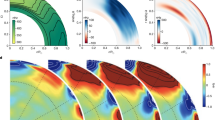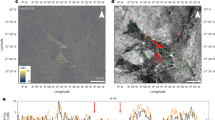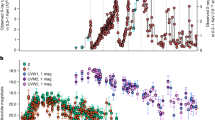Abstract
IT is often assumed that quasars are partaking in the general expansion of the substratum of an isotropic universe. This hypothesis requires that those quasars possessing any particular observational property should be randomly distributed over the sky. In this communication we present evidence which suggests that for at least one such property, the red-shift, quasars may be ordered in sets of decreasing isotropy. If further observations should continue to support this result, the simple cosmological explanation of quasar red-shifts may have to be abandoned in favour of (a) an anisotropic universe or (b) a more local and possibly galactic origin for quasars.
This is a preview of subscription content, access via your institution
Access options
Subscribe to this journal
Receive 51 print issues and online access
$199.00 per year
only $3.90 per issue
Buy this article
- Purchase on Springer Link
- Instant access to full article PDF
Prices may be subject to local taxes which are calculated during checkout
Similar content being viewed by others
References
Sandage, A. R., Astrophys. J., 141, 1560 (1965).
Lynds, C. R., and Sandage, A. R., Astrophys. J., 137, 1005 (1963).
Author information
Authors and Affiliations
Rights and permissions
About this article
Cite this article
STRITTMATTER, P., FAULKNER, J. & WALMSLEY, M. Evidence for a Correlation between the Position and Red-shift of Quasars. Nature 212, 1441–1442 (1966). https://doi.org/10.1038/2121441a0
Received:
Issue Date:
DOI: https://doi.org/10.1038/2121441a0
This article is cited by
-
Distribution of quasars on the sky
Journal of Astrophysics and Astronomy (1984)
-
Are Quasars Local or Cosmological ?
Nature (1972)
-
Angular Distribution of Quasistellar Objects
Nature Physical Science (1971)
-
Gravitational red-shift
Il Nuovo Cimento B Series 11 (1971)
-
Supergalaxy and the quasi-stellar sources
Astrophysics and Space Science (1971)
Comments
By submitting a comment you agree to abide by our Terms and Community Guidelines. If you find something abusive or that does not comply with our terms or guidelines please flag it as inappropriate.



